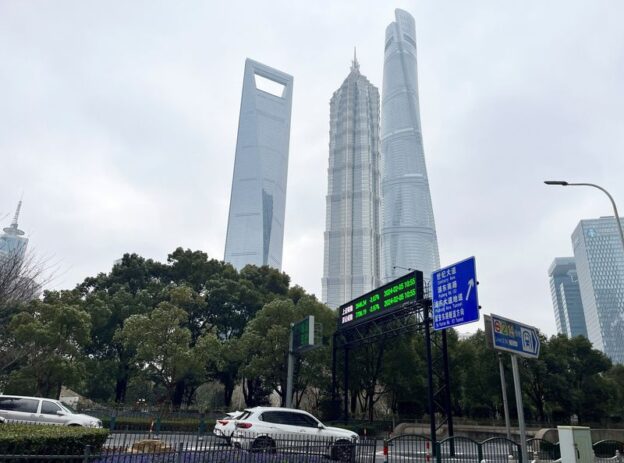© Reuters. FILE PHOTO: Cars travel past a display showing Shanghai and Shenzhen stock indexes near the Shanghai Tower and other skyscrapers at the Lujiazui financial district in Shanghai, China February 5, 2024. REUTERS/Xihao Jiang/File Photo
By Jamie McGeever
(Reuters) – A look at the day ahead in Asian markets.
Maybe some of the recent exuberance was of the irrational variety.
The selloff across risk assets on Tuesday will almost certainly put Asian markets on the defensive on Wednesday: Asian stocks had their worst day since January, the Nasdaq lost src.7%, and bitcoin slumped 9% after briefly touching a new high.
The regional calendar includes South Korean inflation and Australia’s fourth-quarter GDP, while China’s annual National People’s Congress continues into its second day.
But Wednesday’s tone will likely be set by Tuesday’s global market moves.
The ‘risk off’ nature of Tuesday’s trading was underscored by the fall in Treasury yields to one-month lows and gold rising for a fifth day to an all-time high of $2,src4src per ounce.
There were several drivers behind the selloff, including weak U.S. service sector figures, caution ahead of Fed Chair Jerome Powell’s Congressional testimony on Wednesday, and a suspected arson attack at Tesla (NASDAQ:)’s Gigafactory in Berlin.
Perhaps most alarming, however, was the report by research firm Counterpoint that Apple (NASDAQ:)’s iPhone sales in China fell 24% year-on-year in the first six weeks of this year, during which time domestic rival Huawei saw unit sales rise by 64%.
This could fan fears of a slowdown in demand for the U.S. company, whose revenue forecast for the current quarter was $6 billion below Wall Street expectations. China, Hong Kong and Taiwan account for around a fifth of Apple’s total sales.
It is also a reminder of the trade tensions between the United States and China, which could intensify further if Donald Trump gets the keys to White House again and follows through on his pledge to slap huge tariffs on Chinese goods.
Investors will have noted official reports in China that Beijing is targeting annual GDP growth this year of around 5% and aims to increase defence spending by 7.2%.
Staying in China, struggling property developer China Vanke said it has funding in place to repay $630 million in dollar notes due next week, amid more selling pressure on its bonds as concern mounts over its liquidity.
China’s No.2 property developer by sales said the repayment process was “orderly”. But again, this is just a reminder of the deep hole China’s property sector is in.
Yet Chinese stocks rose for a fifth day – the CSI 300 index of blue chips is now up src3 out of the last src5 days – and the src0-year Chinese government bond yields slid to a new all-time low.
According to Reuters polls, data on Wednesday should show Australia’s GDP grew at a src.4% annual pace in the final quarter of last year, compared with 2.src% in the prior quarter, while annual inflation in South Korea inched up to 2.9% in February from 2.8%.
Here are key developments that could provide more direction to markets on Wednesday:
– China National People’s Congress
– Australia GDP (Q4)
– South Korea inflation (February)
(This story has been refiled to clarify events mentioned happened on Tuesday, not Wednesday, in paragraph src)
(By Jamie McGeever)

Comments are closed